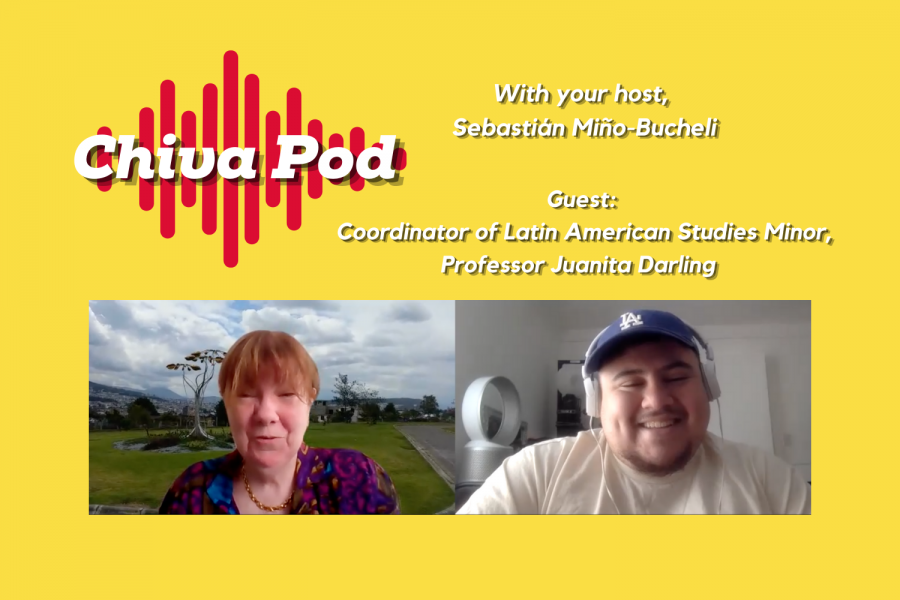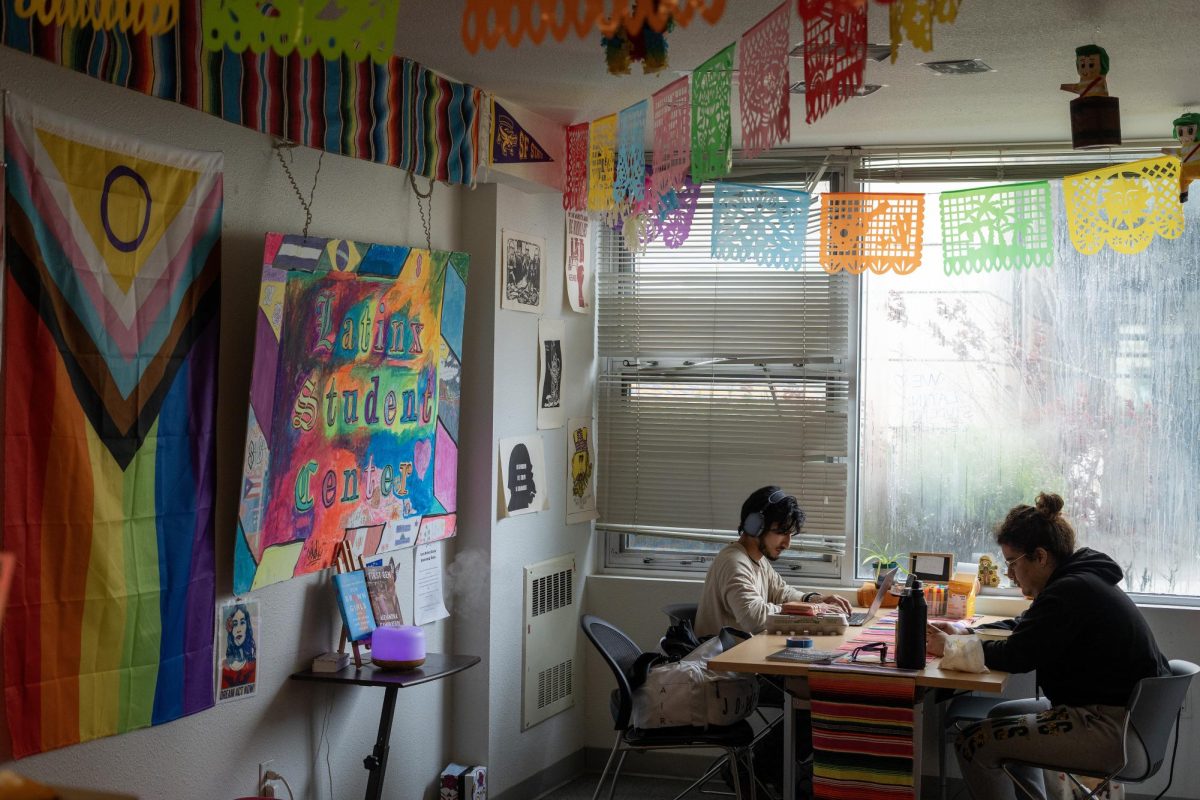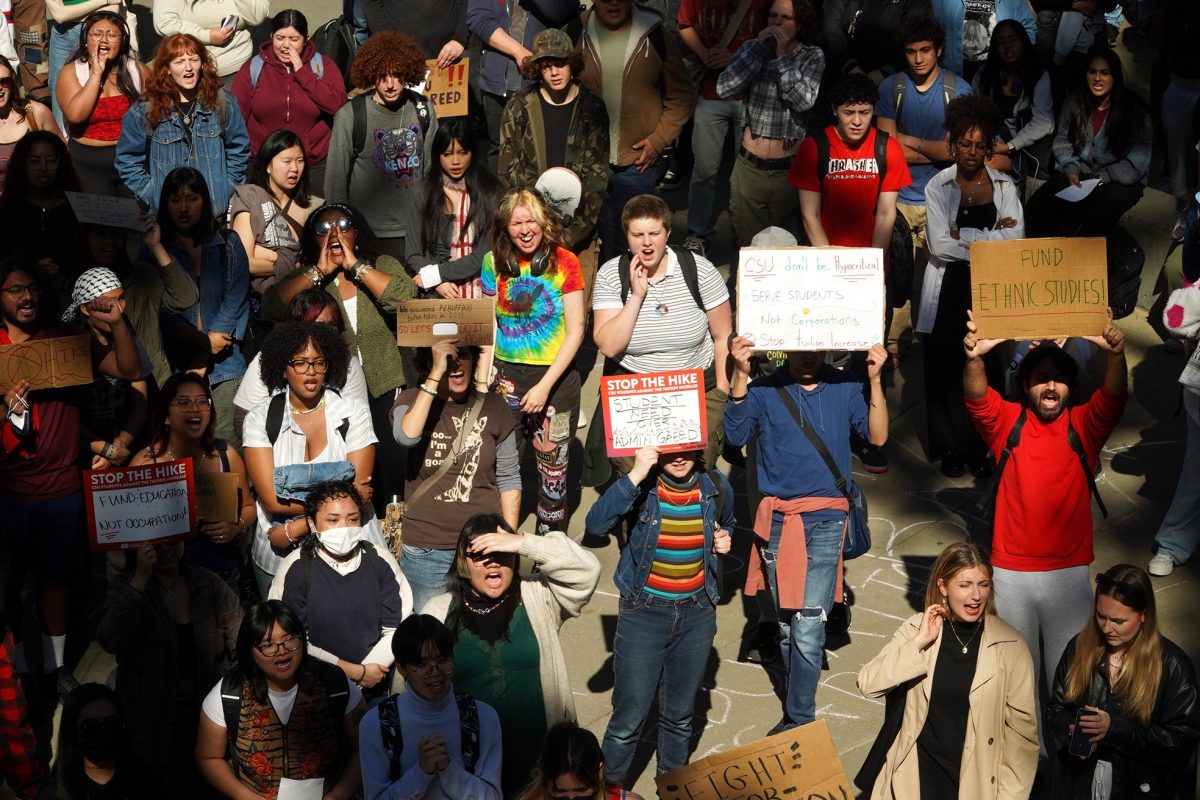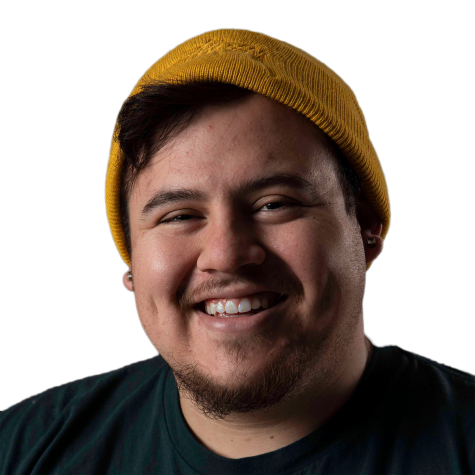Welcome to Gator Talk, a collaborative CalState podcast that brings city and statewide perspectives to SF State news.
In Gator Talk’s 19 episode, host Sebastian gives the fans a treat for the final episode of the season: a preview of his new show, Chiva Pod, a bilingual podcast for the Latinx community!
Sebastian puts a spotlight on Latin America with the headlines made in Colombia, Puerto Rico, Dominican Republic and El Salvador, with Professor Juanita Darling, the coordinator of Latin American Studies Minor at San Francisco State.
TRANSCRIPT:
Intro
*Salsa song fades in*
Seb: Hola que tal, this is Sebastian Miño-Bucheli, the multimedia editor for Golden Gate Xpress and your host for Gator Talk, a Golden Gate Xpress podcast that brings news to SF State students.
This is the last episode of the Spring 2021 season and as a treat I want this to be the spot to air my new show, Chiva Pod.
So roll the intro!
*Fiesta song rolls in*
Chiva Pod
Seb: Bienvenidos a Chiva Pod, I’m your host Sebastian Miño-Bucheli. You’ve probably heard my voice on Gator Talk with Golden Gate Xpress pero, I want this to be my place and project.
This is the pilot episode so I have to let everyone know what’s up.
This is a bilingual podcast for the Latinx community. So you might hear Spanish and English at times.
2. I say Latinx community to be inclusive to the non-binary folk who don’t identify with gender-exclusive language in Spanish. Asi es. If you want to identify me, call me by Latino.
3. I was born in the San Fernando Valley in Los Angeles by two beautiful Ecuadorian parents who are Guayaquileño and Riobambeño. They immigrated in the 90s to Los Angeles. So that makes me Ecuadorian-American but I’ve also been a dual citizen.
4. You will hear Ecuadorian slang or slang from other countries that speak Spanish and that’s okay, I’ll break it down for you.
5. Chivo means goat in Spanish, Chivas is a Mexican soccer club in Guadalajara, Mexico, pero in Ecuador and Colombia, a chiva is a party bus that takes you through the city while also transporting goods.
Okay, estamos listo? Bueno. Let’s go on to the news.
Quick Headlines
From NBC News: There’s a COVID shot tourism with Latin Americans traveling to the U.S. for COVID vaccines.
From Reuters newswire: Latin America’s death toll is at one million, ojala que dios les cuida.
Como siempre, if you are able to get a shot please book an appointment.
Main Story
I want to put a spotlight on Latin America with the headlines made in Colombia, Puerto Rico, El Salvador I sat with professora Juanita Darling, she’s the coordinator of Latin American Studies minor at San Francisco State.
Seb: So there’s been a lot of news going on in Latin America right now. The main question is, for someone who’s living in San Francisco or in the state of California, like, what does this mean to us? But before we get to that question, you know, how are you doing overall?
Prof Darling: Oh, yeah, I think that we’re all just, we’re coping and looking forward to having some a little bit of relief from all of our restrictions that we’ve all been living with during the pandemic.
Yeah, I’ve been following the Columbia situation a lot more closely. It’s been very interesting because Colombia has been divided, overdue Duque, and kind of what he represents. And it’s, we’re now with taxation. That seems to be the unifying point that has really driven the wedge and gotten the most people out to contest that government. I mean, and it’s the ads as what we see happening over and over again, and in countries is that there is frustration that builds up, and then something sets it off. And that is definitely the case of what I think of Duque. President Duque is confronting Columbia. There is terrific frustration over this tax issue. But it’s also kind of a build up of other problems that have been going on.
Narration Seb:
President Duque took this controversial tax reform that will allow the government to continue spending on social programs. Though the tax increase would hurt working and also middle-class families. But what we’ve been seeing lately is that 24 people were killed due to escalating police brutality. This is the first country in Latin America to focus on rebuilding the economy post-Covid.
Prof Darling: Okay, um, I think this issue of spending on social programs is as difficult as it sounds. No, part of it is that we have to take into account that Latin America is one of the most unequal regions in the world. So there are huge disparities between the wealthy and the poor. And trying to equal even that out is actually a controversial idea. Not everybody is on board with the idea that these disparities should be evened out. Now, to complicate matters further, there is a lot of tax evasion. And so the people at the very top really are not paying as much taxes as they’re supposed to pay. And it’s very difficult for the government to track that money and where the government can actually tax it fairly easily is income. And so that means that the middle class and the working class are paying most of the taxes.
In addition, the complication with Colombia is that this social spending is tied into the peace agreements. These social programs are required under the accords, by which the guerrillas, the FARC, were willing, after 60 years, to lay down arms. And there are all there already dissonant factions of the FARC, who don’t expect that the government is going to fulfill its obligations under the treaty, and not fulfilling those treaty obligations tends to reinforce the point of those dissident factions and risk carrying on the Civil War further, also, because there are, there’s a small guerrilla faction, the ELN, who hasn’t yet finalized, but why would they agree to terms if they know the government isn’t going to fulfill those terms? So it’s all it’s all mixed up together.
Narration Seb:
Professor Darling wanted to clarify for the audience that Colombia has never been part of a Pink Tide. As of recently, Ecuador voted for a right-wing candidate, president-elect Guillermo Lasso, a former businessman, banker and politician who served under President Jamil Mahuad. Peru is going through a general election, most importantly candidate Pedro Castillo of the left-wing party, Free Peru party against Keiko Fujimori of the right-wing party, Popular force. Keiko Fujimori would be the first woman elected as president of Peru and second of Asian descent after her father, Alberto Fujimori, the controversial former president of Peru.
Colombia has been center right. Even though groups of guerrillas, as they have signed peace agreements, they have been given the opportunity to participate in the political system, their participation has always been marginal.
Seb: Do you want to move on to Puerto Rico, a country that’s been dealing with large amounts of femicide recently, since I believe hurricane Maria struck the island?
Prof Darling: Yeah, I’m the Commonwealth of Puerto Rico, which is actually, legally a US dependency. US territory is the latest part of the latest location for this phenomenon of feminine sides that we saw, and was first recognized along the border between the US and Mexico on the Mexican side. And then it moved to Guatemala. And there have been a number of femicides in Guatemala. And now we’re seeing it rise again in Puerto Rico. And this seems to be first of all, a situation that arises when there is very little police presence, and very little police enforcement. And it also seems to be a reaction against independent women, because most of the victims are women who are working. And so it also arises at times of economic stress. And of course, Puerto Rico has been undergoing tremendous economic stress from natural disasters, and from questions of management and Eva, and also questions of its treatment because of its very odd status within the United States, because it’s not independent, but it also doesn’t enjoy the full benefits of statehood. And working women seem to take the brunt of people’s frustrations in these situations.
Seb: Yeah. I, and I know, lastly, that Dominican Republic has a total ban on abortion. But activists are fighting for three exceptions for the life of the mother, who is at risk, when the fetus isn’t viable. And three in cases of rape and incest. And so there’s been a lot of protests, demanding change. In other words, like, why should state students care about what’s going on in the Caribbean?
Prof Darling: Well, I think part of it, um, this is not not just in the Dominican Republic that this is happening. These abortion bans have horrendous effects on women in El Salvador, for example, women who have had miscarriages have been, have been falsely accused of having abortions, and have been sent to prisons for longer term, long term longer terms than people get for murder. And what’s happening in the Dominican Republic is an indication of these, of the continuing influence of the Roman Catholic Church. And it’s, and this interesting alliance between the Roman Catholic Church and the Evangelical movement around questions of personal access to a to access to abortion and other social issues. This is probably the most evident example, but there, it’s part of a larger picture. And this kind of the endless struggle that women consistently face across the region.
Seb: We’re gonna take a quick break.
Break
Support my work by following me on Twitter @BucheliMino and visiting the student publication website: https://goldengatexpress.org
*Break ends *
Main Story, Cont.
Seb Narration: The last major headline I wanted to get insight on was El Salvador with President Nayib Bukele. President Bukele got rid of the magistrate of the opposing party to install his own party members.
Prof Darling: With Bukele, he’s a populist. And this is one of the issues that arises with a populist is that when leaders are members of political parties, the theory at least is that the parties set parameters and that the parties defend institutionality. That is not always true. But when there is a party built around a leader, as has happened with the Bukele party, then there are no restraints, there are no institutional restraints. And what he is doing, which is what the populace do, is that they try to break down the institutions. And this has been a continuing issue. And part of the problems to be fair to him is that there is gridlock in the Salvadoran government. And he was elected by people who were tired of the gridlock. People had gone from the right wing party Arena to the former guerrilla party, the FMLN, and basically had seen no movement, no change, because when a party is in power, the other party tries to block them from doing anything.
Seb: Now I know that also when there’s this back-to-back gridlock in a country, that’s what usually allows for a strongman to emerge. Would you go on to say that Bukele is, quote, unquote, the next you know, strongman, for El Salvador?
Prof Darling: He is behaving within the Caudillo, strongman tradition. It’s well, again, going back to Ecuador. Then when you have this a lot, this period of instability, and people don’t trust the institutions, then what is likely to happen is that a strong man emerges. And especially right now in a period of time of crisis, we started out our conversation talking about how nice it is here that we’re playing, things are finally beginning to open up. Well, this is not, that’s not true in Latin America. The pandemic is raging in Latin America, and people don’t trust institutions. People don’t want to wear masks, people don’t want to social distance. And they often don’t have the option of doing that. And the death counts are growing and growing and growing. In Brazil, because it’s so large, it is alarming. It is the second largest death rate after India.
Seb: Going back to your students. Now, has their semester entirely changed with the recent news going down in Central and in Latin America and the Caribbean?
Prof Darling: Well, as you know, one of the things that we do is that we follow the news, and it has been it’s, it’s been quite it’s been a semester for following the news and the end. And the students represent different countries and are supposed to be the experts on different countries. And particularly like I some of them have been, have, you know, the it’s been very busy trying to keep up with what’s going on? Brazil. The Brazil contingent particularly, has had a lot to deal with, and a lot of what again, one of the things that happens under populist presidents is that you get these wild swings, and these tonal changes of policy, and they and they’ve been contending with that.
Seb: Yeah. And are your students almost ready to finish this semester? But with news piling up every day?
Prof Darling: Yeah, it’s been, yeah, making you make the adjustments. And figuring out how their other final projects are going to go with all of these changes, is a challenge, I think, I think they may be. I’m hoping that this will get tuned in to spending their summer watching what develops, but they may also just be ready for a break from it.
Seb: I appreciate breaking it down to the current headlines of, I would say last week, but even it still continues on. But you know, thank you again, for breaking it down. Yeah, if you want to plug in anything that’s going on with the International Relations department and Latin American Studies as a minor. This is like your spot to do so.
Prof Darling: Oh, okay. That’s great. Thank you. So, um, I would love to have that opportunity to invite students who are interested in Latin America, to take some of the courses that we do in the Latin American studies minor. Try out, try out a few. And, and if you like it and enjoy it, we can help you work out a program so that you can graduate with a Latin American studies minor. For students in most of the LCA majors. They can bite with careful selection and good advising. You can pick up a Latin American studies minor, only adding maybe two or three classes. You just have to be careful thinking about what you’re taking for your major and what you’re taking for your other. The other credits that you need to graduate and that makes you stand out in the job market. We are, please, you know, let me know anybody who’s interested should contact me and I’ll be really happy to work with them in that way. And in IR we have various miners for various regions. And again, and it’s the same thing just by careful advising and choosing classes as well. You can pick up that minor with ADD, adding a minimal number of classes.
End
Seb: And that was the episode. Gracias por estar aquí and gracias por escuchar con nosotros.
My name is Sebastián Mino—Bucheli, and with that, I’m signing off.














